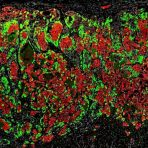Using Human stem cells for treating and understanding diabetes
Using Human stem cells for treating and understanding diabetes
Categories: Lectures and Seminars | Intended for Anyone

Location Details
Sunnyside Branch of the Ottawa Public Library (1049 Bank Street in Old Ottawa South)
Contact Information
Andrea Lawrance, 613-520-2600-2616, andrea.lawrance@carleton.ca
Registration
Cost
Free
About this Event
Host Organization: Faculty of Science
More Information: Please click here for additional details.
Explore Science through Carleton’s popular Science Cafe series! All are welcome at these entertaining and informative public presentations. The next cafe features Professor Jenny Bruin discussing stems cells and diabetes.
Abstract: Diabetes is a chronic disease with devastating complications and an enormous global impact. There are currently 3.5 million people in Canada and more than 415 million people worldwide with diabetes, and these numbers are continually rising. Diabetes is characterized by high blood sugar levels, resulting from insufficient production of insulin from beta cells. Insulin-secreting beta cells are located within cell clusters in the pancreas called ‘islets’. Remarkably, infusion of islet cells from a deceased organ donor can effectively reverse diabetes, but this clinical approach is severely limited by the lack of suitable organ donors. Human stem cells are a promising alternative cell source for transplantation because of their potential to be directed into all cell types in the human body, including insulin-secreting beta cells. I will discuss how we have used human stem cells to reverse diabetes in mice and how stem cells are currently being tested in clinical trials here in Canada. I will also talk about the utility of human stem cells as a novel model system for studying the underlying causes of beta cell destruction and dysfunction in diabetes. By better understanding the root causes of diabetes, we hope to prevent the development of this disease long before treatment is required.